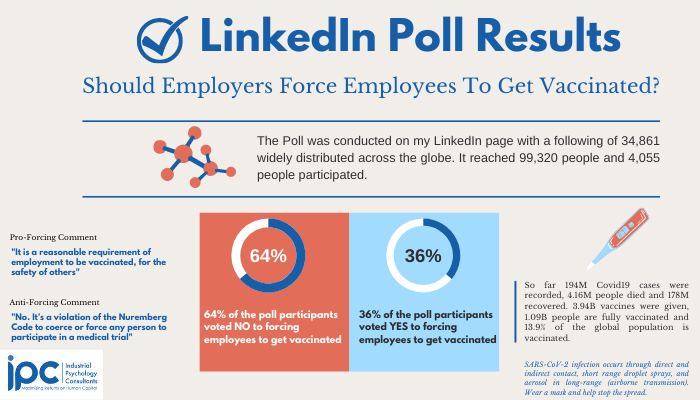With Covid19 vaccines appearing to be our way out of this deadly pandemic and returning to normalcy, most organizations face a dilemma on how to ensure that all their employees are vaccinated. Most people are sceptical of the vaccines and numerous theories circulating on social media are not helping the case. l conducted this poll on my LinkedIn page with a following of 34,861 people, to see how professionals think organisations should handle the vaccination issue. The poll reached 99,320 people from various professional and cultural backgrounds and 4,055 people participated.
Here are the common themes that emerged from the poll.
1. Incentives as opposed to forcing
Several respondents ascended to the importance of vaccination both in the workplace and the society at large. However, they regarded forcing employees as counterproductive. They proposed the use of incentives to entice the employees to get vaccinated. Some cited the strategy being employed by the city of Newyork of offering $100 nudges to those vaccinated. These Organisations like Instacart, Kroger, and Houston Methodist, are using cash incentives. Other organizations are also using various forms of incentives.
2. Indeed employees should be forced
Advertisment
As indicated in the poll results, 36% of the survey respondents regard forcing employees as a necessary measure to fight against the pandemic and return to normalcy. A serious debate raged in the comment section between those supporting forcing employees to be vaccinated and those against. The common argument is that Covid19 is a matter of public health hence, individual choices are less critical.
As long as one’s choices infringe the rights of others, it’s incumbent upon society to take reasonable measures to protect all. Therefore employers must force employees to get vaccinated to protect everyone. This is particularly important in certain jobs where an employee has to deal with vulnerable members of society, e.g. in the health sector, nursing homes, etc.
Another response highlighted that employers reserve the right to indirectly discriminate on who they employ based on their ability to do the job and protect others. By placing the safety of others at the heart of their argument and decision, employers will have a right to force employees to get vaccinated.
The devastating effects of Covid19 on the economy were as given as a good rational rationale for forcing the workers to get vaccinated. The cost of downtime due to illnesses, replacing deceased employees, reduced sales and revenues due to lockdowns are enormous. The disruption of supply chains is collapsing many businesses; therefore, forcing vaccines on employees can mitigate that.

3. Educate and raise awareness
Under this theme, respondents pointed out that most of these employees are reasonable people who will make correct choices if adequately educated and informed. Most people echoed the sentiment that the majority of the people are not well informed concerning vaccines. The lack of information is breeding mistrust. People in this category pointed out that the companies can raise awareness and educate, anything after that rest with the employees themselves.
4. Human rights, constitution, and Government
For most constitutional democracies, forcing people to do something against their will, especially in issues concerning their health, is frowned upon and regarded as a violation of human rights.
Respondents highlighted that coercing employee to get vaccinated is unconstitutional, and organizations can be exposed to litigations. This leaves it to society and its institutions to interpret the existing laws or create new ones.
Others reasoned that protecting the society amid this public health disaster is the responsibility of Governments, hence the authorities need to enact legislation that protects everyone by compelling people to get vaccinated. Companies have no legal or moral ground to force people to get vaccinated.
5. Restricting unvaccinated workers from accessing the workplace
Instead of forcing employees to get vaccinated, employers have the choice of denying them access to the workplace. This can be done in tandem with other strategies like remote working and working from home. Netflix, for example, is requiring all the actors on the set to be vaccinated. Companies like Google and Uber are also making such a requirement.
Memory Nguwi is an Occupational Psychologist, Data Scientist, Speaker, & Managing Consultant- Industrial Psychology Consultants (Pvt) Ltd a management and human resources consulting firm. https://www.linkedin.com/in/memorynguwi/ Phone +263 4 481946-48/481950/2900276/2900966 or cell number +263 77 2356 361 or email: mnguwi@ipcconsultants.com or visit our website at www.ipcconsultants.com





